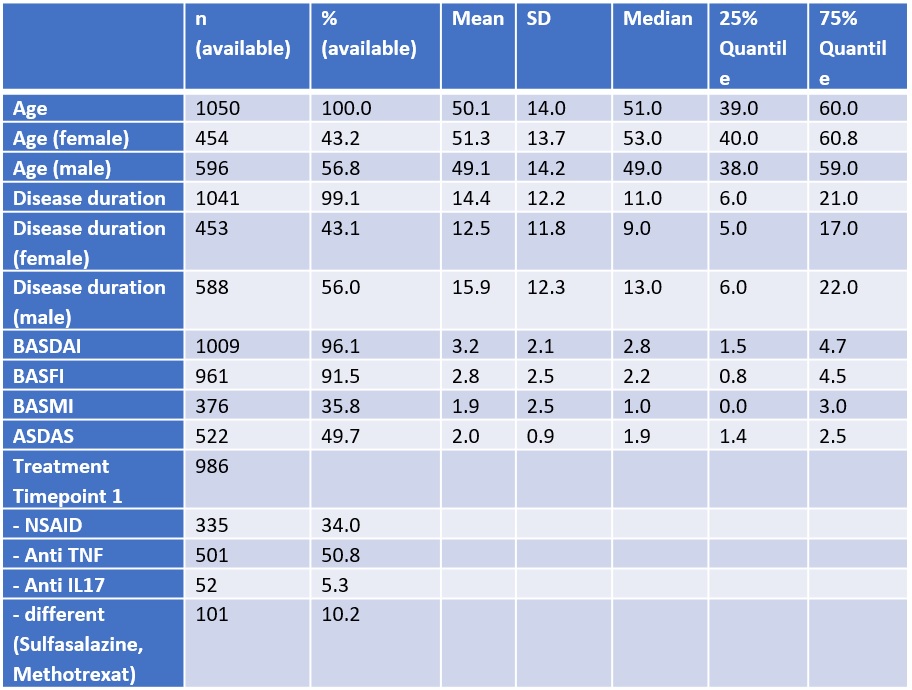Session Information
Date: Sunday, November 7, 2021
Title: Spondyloarthritis Including PsA – Treatment Poster I: Axial Spondyloarthritis (0908–0939)
Session Type: Poster Session B
Session Time: 8:30AM-10:30AM
Background/Purpose: Increasing immunmodulatory treatment options are available for axial spondyloarthritis. Little is known about sequential treatment in clinical routine.
Methods: The pseudonymized RHADAR database (Kleinert, S. et al, J Med Internet Res. 2021;23(5):e28164) was analyzed with a special emphasis on patients with axSpA and with databank entries in the last 9 months before March 31st 2021. Their current and previous therapies were analyzed using the statistic software R (version 3.5.1) and RStudio (version 1.1.453). Documented therapies between 2011 and 2021 were included.
Results: Characteristics of the 1050 axSpA-patients are displayed in table 1. In 986 patients at least two timepoints of therapy could be analyzed. 77.2% stayed on the treatment of timepoint 1, 21.8% patients changed treatment at timepoint 2, and 4.2 % changed again at a 3rd timepoint.
At timepoint 1, 501 patients were on anti-TNF treatment; of which 379 (75.6%) therapy remained unchanged . At timepoint 2 57 (11,4%) changed to a different TNF blocker, 33 (6,6%) to NSAID only, 16 (3,2%) to anti-IL17 treatment, and 2 (0,4%) to treatment with a Janus kinase inhibitor.
NSAID therapy was applied in 335 patients at timepoint 1, of those, 281 (83.9%) remained on same therapy., 45 (13,4%) changed to anti-TNF treatment, 6 (1,8%) to anti-IL17 treatment at timepoint 2.
Among the 52 (5.3%) patients on anti-IL17 treatment at timepopint 1 38 (73,1%) continued their therapy unchanged , 7 changed to NSAIDs, 4 to a different anti-IL17 inhibitor, and 2 to anti-TNF treatment.
Conclusion: The majority of the patients 50,8% (501/986) were treated with an TNF-inhibitor, 34% (335/986) received NSAIDs only, while 5,3% were on IL17-inhibitor at timepoint 1. Regardless of the treatment modality at timepoint 1 majority of axSpA-patients continued their therapy unchanged. The most likely explanation to this observation is the low disease activity as reflected by the disease activity indices in table 1.
The emerging immunomodulatory therapeutic options will offer further alternative pathways in the sequential treatment of axSpA patients.
To cite this abstract in AMA style:
Kleinert S, Bartz-Bazzanella P, Von der Decken C, Karberg K, Schuch F, Gauler G, Wurth P, Späthling-Mestekemper S, Kuhn C, Proft F, Poddubnyy D, Englbrecht M, Vorbrüggen W. Sequential Treatment in Axial Spondyloarthritis – Real World Data from a Network of German Rheumatologists [abstract]. Arthritis Rheumatol. 2021; 73 (suppl 9). https://acrabstracts.org/abstract/sequential-treatment-in-axial-spondyloarthritis-real-world-data-from-a-network-of-german-rheumatologists/. Accessed .« Back to ACR Convergence 2021
ACR Meeting Abstracts - https://acrabstracts.org/abstract/sequential-treatment-in-axial-spondyloarthritis-real-world-data-from-a-network-of-german-rheumatologists/

